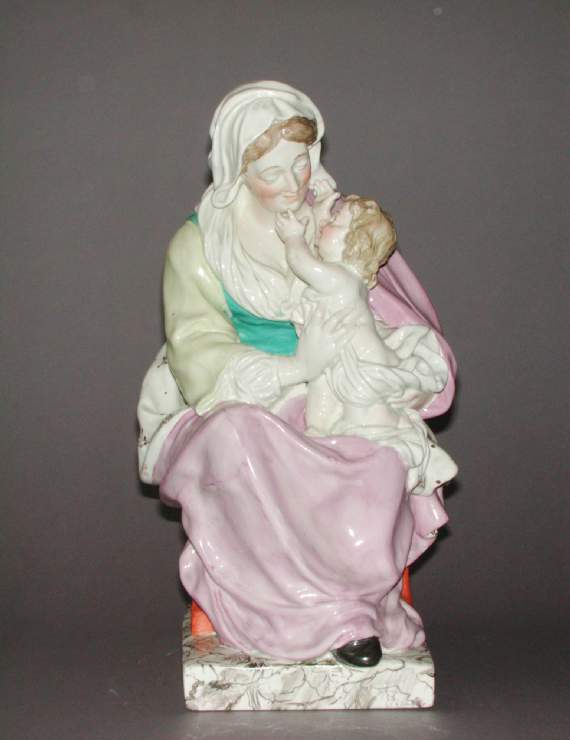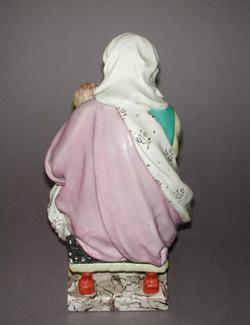Current Location: Gallery 27 (Glaisher)
Titles
Seated Virgin and Child
Maker(s)
Factory:
Wood, Enoch
(Probably)
Entities
Categories
Description
Lead-glazed earthenware painted in polychrome enamels
Earthenware, moulded, covered with slightly blue-tinted lead-glaze and painted in turquoise, yellow, pink, flesh-pink, red, brown, grey and black enamels. The Virgin is seated on a stool with the Christ Child kneeling on her lap. She wears a white veil and fichu, and has wrapped about her, a pink cloak with a flowered lining. The shallow square base is coloured to resemble marble.
Notes
History note: Argyll Street (Regent Street) sale room, 6 March 1911, lot 102, bought by Mr Fenton for 19½ guineas on behalf of Dr J.W.L. Glaisher, FRS, Trinity College, Cambridge
Legal notes
Dr J.W.L. Glaisher Bequest
Measurements and weight
Depth: 16.7 cm
Height: 34 cm
Width: 18.8 cm
Acquisition and important dates
Method of acquisition: Bequeathed
(1928-12-07)
by
Glaisher, J. W. L., Dr
Dating
18th Century, Late
George III
Circa
1785
CE
-
1800
CE
Note
This group owes its distinction to its model: a terracotta by the Flemish sculptor, Lucas Fayd'herbe (1617-97), which from about 1773 to 1918 was at Gopsall Hall, Atherstone, near Leicester, and is now in the British Museum (1957,11-1.1). This was presumably the model for a marble at Brough Hall, Yorkshire (see Country Life, 1967, pp. 949-50, fig. 8) The details of the earliest earthenware models are so close to the terracotta that the manufacturer probably had access to moulds taken directly from it, the small difference in their size resulting from shrinkage of the clay during firing. Later examples do not have such precise definition and a variant shows the Virgin seated on a rocky mound (Cecil Higgins Art Gallery, Bedford (C 33),. It is also known in red earthenware with a brown, bronze-like glaze (V & A C.480-1918). The latter, and an enamelled example in the Potteries Museum, Hanley, bear the mark used between about 1793-1818 by Enoch Wood and James Caldwell.
School or Style
Baroque
People, subjects and objects depicted
Components of the work
Decoration
composed of
enamel
( turquoise, yellow, pink, flesh-pink, red, brown, grey and black)
Materials used in production
slighty blue tinted
Lead-glaze
Earthenware
Techniques used in production
Moulding
: Learthenware, moulded, with slightly blue-tinted lead-glaze, painted overglaze in turquoise, yellow, pink, flesh-pink, red, brown, grey and black enamels
Lead-glazing
References and bibliographic entries
Related exhibitions
Identification numbers
Accession number: C.901-1928
Primary reference Number: 76327
Old object number: 3364
Stable URI
Audit data
Created: Saturday 6 August 2011
Updated: Tuesday 30 April 2024
Last processed: Tuesday 15 July 2025
Associated departments & institutions
Owner or interested party:
The Fitzwilliam Museum
Associated department:
Applied Arts





